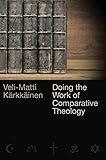Doing the Work of Comparative Theology / Veli-Matti Karkkainen. [print]
Material type: TextPublication details: Grand Rapids, Michigan ; Wm. B. Eerdmans Publishing Company, (c)2020.Description: xiii, 321 pages ; 24 cmContent type:
TextPublication details: Grand Rapids, Michigan ; Wm. B. Eerdmans Publishing Company, (c)2020.Description: xiii, 321 pages ; 24 cmContent type: - text
- unmediated
- volume
- 9780802874665
- BR127.K18.D656
- BR127
- COPYRIGHT NOT covered - Click this link to request copyright permission:
| Item type | Current library | Collection | Call number | Status | Date due | Barcode | |
|---|---|---|---|---|---|---|---|
 Circulating Book (checkout times vary with patron status)
Circulating Book (checkout times vary with patron status)
|
G. Allen Fleece Library CIRCULATING COLLECTION | Non-fiction | BR127.K375.D656 2020 (Browse shelf(Opens below)) | Available | 31923001898614 |
Browsing G. Allen Fleece Library shelves, Shelving location: CIRCULATING COLLECTION, Collection: Non-fiction Close shelf browser (Hides shelf browser)
Introduction: what is comparative theology? Why do we need it? -- Orientation: why do we need comparative theology? -- Comparative theology and related disciplines in the interfaith engagement -- Is comparative theology feasible? -- Comparison for a better understanding -- Comparison for the sake of the truth -- A hospitable dialogue -- On the nature and approach of this primer -- Revelation and scripture among religions -- Revelation and scripture in Christian tradition -- The challenge and complexity of interfaith engagement of scriptures -- Hindu scriptures and authority in a Christian perspective -- Revelation and scripture in Buddhism -- The Qur'an and the Bible as vehicles of divine revelation -- The Bible between the Jews and Christians -- Common scripture reading as a form of interfaith theologizing -- The triune God among religions -- The doctrine of the triune God in Christian tradition -- The task of the comparative study of God -- Allah and the Triune God -- Brahman and the trinitarian God -- Any God(s) in Buddhism? -- Religion, God(s), and violence -- Nature and creation in religions' imagination -- The Christian doctrine of creation -- The question of origins in comparative perspective -- On science-religion engagement in the interfaith context -- Origins of the cosmos in religions' imagination -- Abrahamic and Asiatic traditions in comparison -- On ecological resources and challenges among religions -- Humanity and human nature in religion's teachings -- Humanity and human nature in Christian theology -- Humanity in Abrahamic traditions -- Humanity in Asiatic traditions -- What is wrong with us? Sin and the fall in Christian theology -- The human condition in religions' visions -- Jesus Christ and "Savior" figures among religions -- Christian christology in a nutshell -- The Jewish messiah- the Christian messiah -- Jesus in light of Islamic interpretations -- Jesus and Buddha: Christian-Buddhist engagement on Jesus -- Christ and avatars: Hindu-Christian engagement on Jesus -- "Atonement" and reconciliation among religions -- Christian theology of atonement -- The messiah of Israel and the savior of the nations: a Jewish-Christian engagement -- The Christian theology of the cross in light of the Islamic interpretation -- Reconciliation and "savior" in Buddhist perspectives -- Reconciliation and the cross in Hindu assessment -- Holy Spirit and the S/spirit(s) of religions -- Holy Spirit and spiritual powers in Christian theology and among religions -- Ruach ("Spirit") in Jewish traditions -- Ruh ("Spirit") in the Qur'an and Islamic spiritualities -- Atman and the Holy Spirit: pneumatology in Hindu-Christian perspective -- Pneumatology in Buddhist-Christian perspective -- Spirits and powers among living faith traditions -- Christian guidelines for the discernment of the spirit(s) among religions -- Visions of "salvation" and liberation among religions -- Christian theology of salvation -- Salvation as redemption and submission in Abrahamic faiths -- The human condition in Hindu vision(s): diagnosis and solution -- Dukkha and enlightenment: Buddhist visions of liberation -- A summative Christian engagement of two Asiatic traditions -- Comparative case studies in aspects of salvation among religions -- The church and religious communities -- Ecclesiology, the Christian doctrine of the church -- Visions of community among religions: an orientational note -- Synagogue-the Jewish community -- Ummah-the Islamic community -- Hindu spiritual life and community -- The Buddhist Sangha and the pursuit of enlightenment -- Eschatological visions and symbols among religions -- Eschatology in Christian tradition and among religions -- Jewish eschatology -- Islamic eschatology -- "End-time" visions and symbols in Hindu traditions -- Buddhist visions of end and "release" -- Epilogue: in search of a "proper confidence".
In a world that is more religiously diverse than ever before, our coworkers and neighbors may well be adherents of other faiths. But how many of us really grasp the similarities and differences between the major world religions? Comparative theology is one increasingly important way to bridge this gap, especially for Christian leaders and professors, but also for lay people and students. Veli-Matti Kärkkäinen introduces the nature and work of comparative theology, then delves into a detailed doctrine-by-doctrine comparison of Christian teachings with those of historical and contemporary Judaism, Islam, Buddhism, and Hinduism. With every doctrine, he first presents a summary of consensual Christian belief and then orients the reader to the distinctive teachings of other faith traditions, highlighting parallels and differences. Ideal for students, ministers, instructors, and lay people interested in interfaith dialogue, Doing the Work of Comparative Theology distills the comparative-theological rigor of Kärkkäinen's Constructive Christian Theology for the Pluralistic World series into an accessible and user-friendly textbook. Readers will not only learn basic methodology but also begin to undertake the actual work of comparative theology.
COPYRIGHT NOT covered - Click this link to request copyright permission:
There are no comments on this title.



